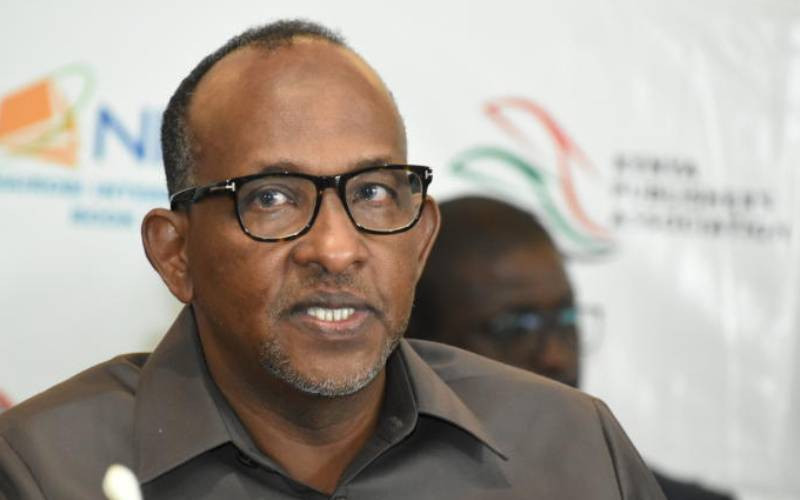 |
|
Martin Wambora PHOTO: COURTESY |
By ROSELYNE OBALA
Kenya: The reinstatement of Martin Wambora as governor of Embu County brings joy to the individual politician and his supporters, disappointment to opponents, but also adds a legal circus to the entire drama.
Over the last two months, Wambora has been back and forth in the courtrooms and shuffled along corridors of the Embu County Assembly and the Senate in Nairobi.
And now chances are that he might face the axe, yet again, if threats by some Members of the County Assembly (MCAs) of Embu are anything to go by. It will indeed be a major legal circus if the MCAs make good their threat. The county assembly leaders, who maintain Wambora “is governor of the courts and not ours”, have already presented to their Speaker, Justus Kariuki, a Motion through Ibrahim Swaleh that seeks to remove Wambora “again”. The governor has dismissed the MCAs’ intention as premature.
Hard stand
With each side taking a hard stand on the matter, it is unclear for how long the current ping-pong will last. But Wambora is not alone, as cases involving fellow governors Peter Munya (Meru County) and Okoth Obado (Migori County) have taken the same winding legal route. Opponents of Munya and Obado initially filed petitions in the High Court but their cases were dismissed, only for the Court of Appeal to overturn their victories and nullify their elections.
The two governors have separately filed appeals to the Supreme Court, the highest in the land. Amid the ping-pong, confrontation pitting the Judiciary and Parliament is threatening to get out of hand, as each institution vows to protect its independence. The decision by Kerugoya High Court to reinstate Wambora as governor has particularly irked the Senate and rekindled intense debate that dominated the media on the doctrine of separation of powers between the three arms of Government early this year. Senators have faulted the ruling, saying the decision is not only impractical but also totally flawed and a serious assault on the Constitutional order.
Turf wars
And they are vowing not to back down on the matter insisting the impeachment of Wambora was a parliamentary and not a Judiciary process. Senate Majority leader Kithure Kindiki says they will fiercely defend their independence, and warns that any institution encroaching on their liberty will be courting disaster.
“The impeachment process was within the law. The Judiciary has interpreted the law on the matter but it cannot force Parliament to do what they think is right,” said Prof Kindiki, a lawyer.
“We are not ready to engage in unnecessary wrangles with the courts of law, we want to work in the confines of decorum and public civility,” he said.
Senate Devolution chairman Kipchumba Murkomen and Siaya Senator James Orengo term the return of Wambora following the court ruling as amounting to reversing the gains in expanding the country’s democratic space through a liberal Constitution.
But Council of Governors Chairman Isaac Ruto has welcomed Wambora’s reinstatement pointing out that devolution faced numerous challenges.
He, however, asked each Kenyan to play his or her role to safeguard the system in order for the gains to accrue to the entire nation. “We support the principle of separation of powers and call for respect of the Judiciary. All levels of Government must be respected in the execution of their constitutional mandate. This will give the public confidence in the leadership and governance of our country and guarantee stability,” he told The Standard On Sunday. The irony of the prolonged electoral petitions of governors is that while they have taken over a year to resolve — and could still stretch on between the courts and corridors of the Senate — the Constitution demands that the presidential petition be heard and concluded within 14 days. Yet the presidential ballot has a wider constituency, is more complex and weightier.
When Wambora was kicked out of office on February 14, there were concerns that the move would set a dangerous precedence at the counties, where MCAs would hold governors at ransom and indict them at the slightest disagreement. Already, Kitui and Vihiga Counties Assemblies have issued threats to take action against their governors Julius Malombe and Moses Akaranga, respectively.
Stay informed. Subscribe to our newsletter
In Wambora’s case, even though MCAs in his county have immediately kicked off the process of impeaching him, yet again, relevant statutes of the law indicate that such a process can only be restarted after three months. And legal experts further warn that such an exercise is bound to fail if it is premised on sheer malice, revenge or bad faith.
East Africa Law Society President Aggrey Mwamu and constitutional lawyer Peter Wanyama differ in opinion with the lawmakers stressing that the Judiciary must patrol the borders of the Constitution to ensure checks and balances, as has been indicated by the Chief Justice Willy Mutunga.
Row with Parliament
They question why the Senators moved to court to seek advise on the Division of Revenue Allocation, 2013 dispute, instead of resolving their disagreement with the National Assembly. “The impeached process was flawed from the start, the County Assembly ignored a court order and therefore the Senate should not have continued with the impeachment process,” says Mwamu.
He says that the Constitution was not envisaged to have governors sent home at the slightest disagreement, noting that the country will be treated to endless drama.
“This is a legal process as much as it is a political process. Senate should ensure in exercising it is in accordance with the law,” the lawyer added. Wanyama regrets that the lawmakers are deriving their arguments from the old Constition. He says that no one is above the law and therefore any party aggrieved has the right to move to court, which has the final say.
He dismisses the Senators’ arguments, saying they are purely political but when it comes to the legal aspect, the court acted in accordance with the law.
Kericho Governor Paul Chepkwony said all institutions must respect the rule of law and courts, failure of which the country can slide into anarchy.
“In the event of a dispute, the courts act as the arbitrators. This country has a bright future if all respect the law and work in mutual respect,” he said.
He added: “The other arms can succumb to political influence but the courts will always still to the law.” Ruling in favour of Wambora, judges Boaz Olao, Hedwig Ong’udi and Cecile Githua noted that the Embu County assembly and the Senate acted in contravention of the court orders and therefore the impeachment process was null and void.
However, Kindiki faults the judges on the issue of injuncting the Senate but concurs with them on the fact that the Embu County Assembly is not immune and should therefore have obeyed the orders.
 The Standard Group Plc is a
multi-media organization with investments in media platforms spanning newspaper
print operations, television, radio broadcasting, digital and online services. The
Standard Group is recognized as a leading multi-media house in Kenya with a key
influence in matters of national and international interest.
The Standard Group Plc is a
multi-media organization with investments in media platforms spanning newspaper
print operations, television, radio broadcasting, digital and online services. The
Standard Group is recognized as a leading multi-media house in Kenya with a key
influence in matters of national and international interest.
 The Standard Group Plc is a
multi-media organization with investments in media platforms spanning newspaper
print operations, television, radio broadcasting, digital and online services. The
Standard Group is recognized as a leading multi-media house in Kenya with a key
influence in matters of national and international interest.
The Standard Group Plc is a
multi-media organization with investments in media platforms spanning newspaper
print operations, television, radio broadcasting, digital and online services. The
Standard Group is recognized as a leading multi-media house in Kenya with a key
influence in matters of national and international interest.







